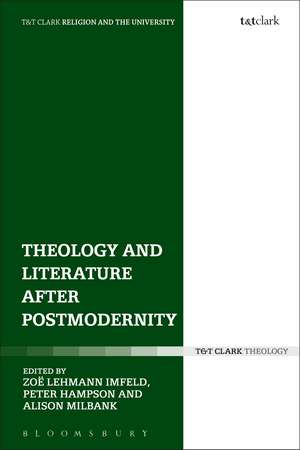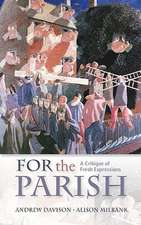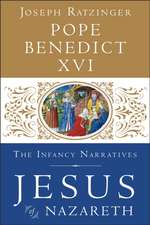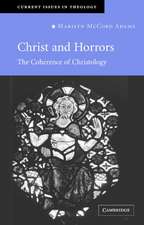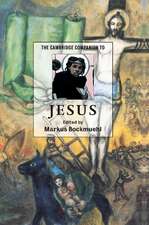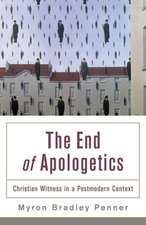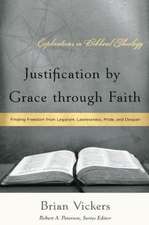Theology and Literature after Postmodernity: Religion and the University
Editat de Zoë Lehmann Imfeld, Dr Peter Hampson, Rev'd Canon Professor Alison Milbanken Limba Engleză Paperback – 21 sep 2016
| Toate formatele și edițiile | Preț | Express |
|---|---|---|
| Paperback (1) | 258.69 lei 6-8 săpt. | |
| Bloomsbury Publishing – 21 sep 2016 | 258.69 lei 6-8 săpt. | |
| Hardback (1) | 775.26 lei 6-8 săpt. | |
| Bloomsbury Publishing – 11 mar 2015 | 775.26 lei 6-8 săpt. |
Preț: 258.69 lei
Nou
Puncte Express: 388
Preț estimativ în valută:
49.51€ • 51.49$ • 40.87£
49.51€ • 51.49$ • 40.87£
Carte tipărită la comandă
Livrare economică 12-26 aprilie
Preluare comenzi: 021 569.72.76
Specificații
ISBN-13: 9780567672056
ISBN-10: 0567672050
Pagini: 304
Dimensiuni: 156 x 234 x 16 mm
Greutate: 0.42 kg
Ediția:NIPPOD
Editura: Bloomsbury Publishing
Colecția T&T Clark
Seria Religion and the University
Locul publicării:London, United Kingdom
ISBN-10: 0567672050
Pagini: 304
Dimensiuni: 156 x 234 x 16 mm
Greutate: 0.42 kg
Ediția:NIPPOD
Editura: Bloomsbury Publishing
Colecția T&T Clark
Seria Religion and the University
Locul publicării:London, United Kingdom
Caracteristici
Uses theology in a reconstructive approach to contemporary literary criticism, filling a gap in field
Notă biografică
Zoë Lehmann Imfeld is Lecturer in English Literature at the University of Bern, Switzerland.Peter Hampson is a Research Fellow at Blackfriars Hall, University of Oxford, UK.Alison Milbank is Associate Professor in Literature and Theology at the University of Nottingham, UK.
Cuprins
Table of ContentsForewordStanley Hauerwas, Duke University, USAIntroduction: Hospitable Conversations in Theology and Literature: Re-opening a Space to be Human The EditorsPart One: Pedagogy1. Religion, History, and Faithful ReadingSusannah Brietz Monta, University of Notre Dame, USA2. Theology, Literature and Prayer: A Pedagogical SuggestionVittorio Montemaggi, University of Notre Dame, US 3. Bleak Liturgies: R. S. Thomas and 'changes not to his liking'Hester Jones, University of Bristol, UKPart Two: Theological and Literary Reconstructions4. Belief and ImaginationGraham Ward, Christ Church, University of Oxford, UK5. Literary Apologetics beyond Postmodernism: Duality and Death in Philip Pullman and J.K. RowlingAlison Milbank, University of Nottingham, UK6. Cusa: A Pre-modern Postmodern Reader of ShakespeareJohannes Hoff, Heythrop College, UK and Peter Hampson, Blackfriars Hall, UK7.'The One Life within Us and Abroad': Pathetic Fallacy Reconsidered Gavin Hopps, University of St Andrews, UK 8. Love Among the Ruins: Hermeneutics of Theology and Literature in the University after the 20th centuryJeffrey Keuss, Seattle Pacific University, USA9. 'Thrashing between Exoneration and Excoriation: Creating Narratives in We Need to Talk about KevinZoë Lehmann Imfeld, University of Bern, Switzerland10. The Shakespeare Music: Eliot and von Balthasar on Shakespeare's 'romances' and the 'ultra-dramatic'Aaron Riches, Instituto de Teología Lumen Gentium, Instituto de Filosofía Edith Stein, Spain11. Fictioning Things: Gift and NarrativeJohn Milbank, University of Nottingham, UK12. Language, Reality and Desire in Augustine's De DoctrinaRowan Williams, Magdalene College, University of Cambridge, UKIndex
Recenzii
Of the contributions to this volume John Milton might well have exclaimed, "O how comely it is, and how reviving to the spirits of just men long oppressed" by the "disciplinary division and animosity in the modern university between Literature and Theology" ... For here is a book advocating a revolutionary breach of the old established boundaries between the two above-mentioned disciplines in favour of a theological approach to literature and a literary approach to theology.
This fine collection features some of the liveliest minds at work in Anglophone literary and theological study. They avoid the postmodernist denial of any transcendent basis for such binaries as belief and unbelief, time and eternity, comedy and tragedy. Instead, they unite such contraries within a complex and difficult tension that identifies both the absence and presence of God in a secular age such as ours. They do so by fresh readings of figures which range from Augustine and Gregory the Great to Dante and Nicholas of Cusa, from Shakespeare and Wordsworth to Graham Greene and R. S. Thomas, on to Philip Pullman and J. K. Rowling. Here is a veritable feast for body and soul, mind and heart alike.
Theology and Literature after Postmodernity brings us an intelligently provocative set of essays. To read them all is to have one's sense of the possible interactions of theology and literature greatly expanded. The essays provide many insightful, even brilliant, readings of texts, but their greater contribution is to lay paths for future scholarship, for those who have the courage and resourcefulness to follow
The aim of this volume, the editors make clear, is to create a 'hospitable' space where theological and literary texts, and those who read, write and discuss them, can converse creatively and openly. 'Hospitality' implies food offered to a guest. We receive a banquet here: a rich variety of remarkably thought-provoking essays, with something for every taste. It is one of those 'all-you-can-eat' banquets, as each 'dish' (or chapter) invites and repays multiple 'tastings'. Hospitality also creates an abiding debt of gratitude to the host; and certainly, I closed this book conscious, not only of a sense of fullness and well-being, but of a debt to all who 'hosted' me as I read their works.
Reveals the need for an ongoing interdisciplinary exploration of literature and theology. This collection shows that there is not one, single way to approach literature and theology; the collection's wide approach is thus, a major strength of the work. I recommend Theology and Literature After Postmodernity to theologians, literary critics, and anyone interested in imagining 'a welcoming space of future possibilities reclaimed by theology and literature' (10).
This fine collection features some of the liveliest minds at work in Anglophone literary and theological study. They avoid the postmodernist denial of any transcendent basis for such binaries as belief and unbelief, time and eternity, comedy and tragedy. Instead, they unite such contraries within a complex and difficult tension that identifies both the absence and presence of God in a secular age such as ours. They do so by fresh readings of figures which range from Augustine and Gregory the Great to Dante and Nicholas of Cusa, from Shakespeare and Wordsworth to Graham Greene and R. S. Thomas, on to Philip Pullman and J. K. Rowling. Here is a veritable feast for body and soul, mind and heart alike.
Theology and Literature after Postmodernity brings us an intelligently provocative set of essays. To read them all is to have one's sense of the possible interactions of theology and literature greatly expanded. The essays provide many insightful, even brilliant, readings of texts, but their greater contribution is to lay paths for future scholarship, for those who have the courage and resourcefulness to follow
The aim of this volume, the editors make clear, is to create a 'hospitable' space where theological and literary texts, and those who read, write and discuss them, can converse creatively and openly. 'Hospitality' implies food offered to a guest. We receive a banquet here: a rich variety of remarkably thought-provoking essays, with something for every taste. It is one of those 'all-you-can-eat' banquets, as each 'dish' (or chapter) invites and repays multiple 'tastings'. Hospitality also creates an abiding debt of gratitude to the host; and certainly, I closed this book conscious, not only of a sense of fullness and well-being, but of a debt to all who 'hosted' me as I read their works.
Reveals the need for an ongoing interdisciplinary exploration of literature and theology. This collection shows that there is not one, single way to approach literature and theology; the collection's wide approach is thus, a major strength of the work. I recommend Theology and Literature After Postmodernity to theologians, literary critics, and anyone interested in imagining 'a welcoming space of future possibilities reclaimed by theology and literature' (10).
